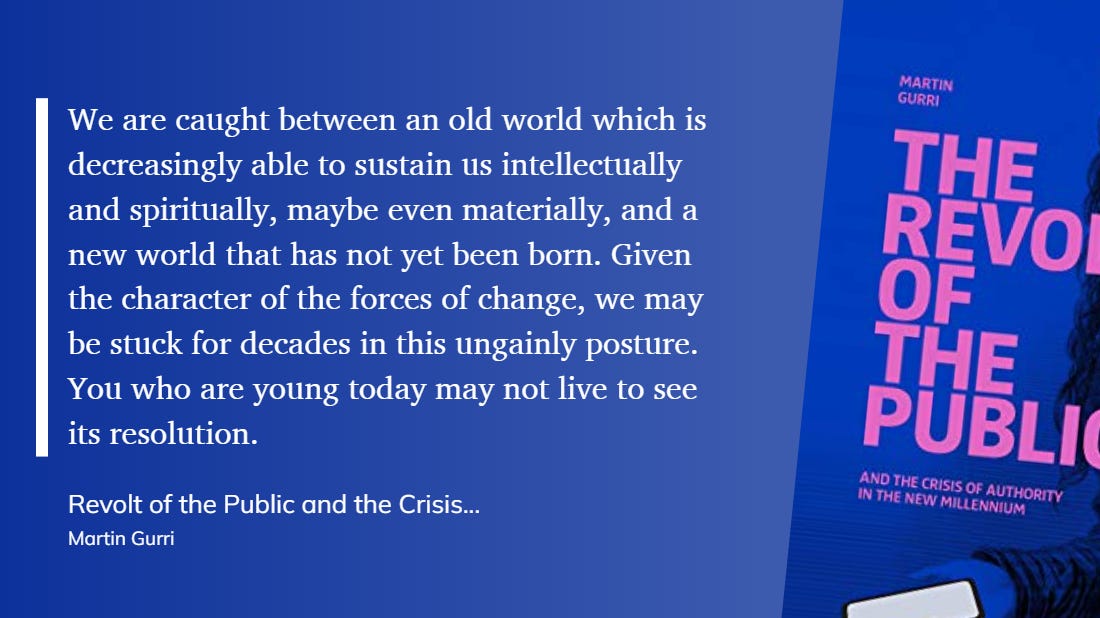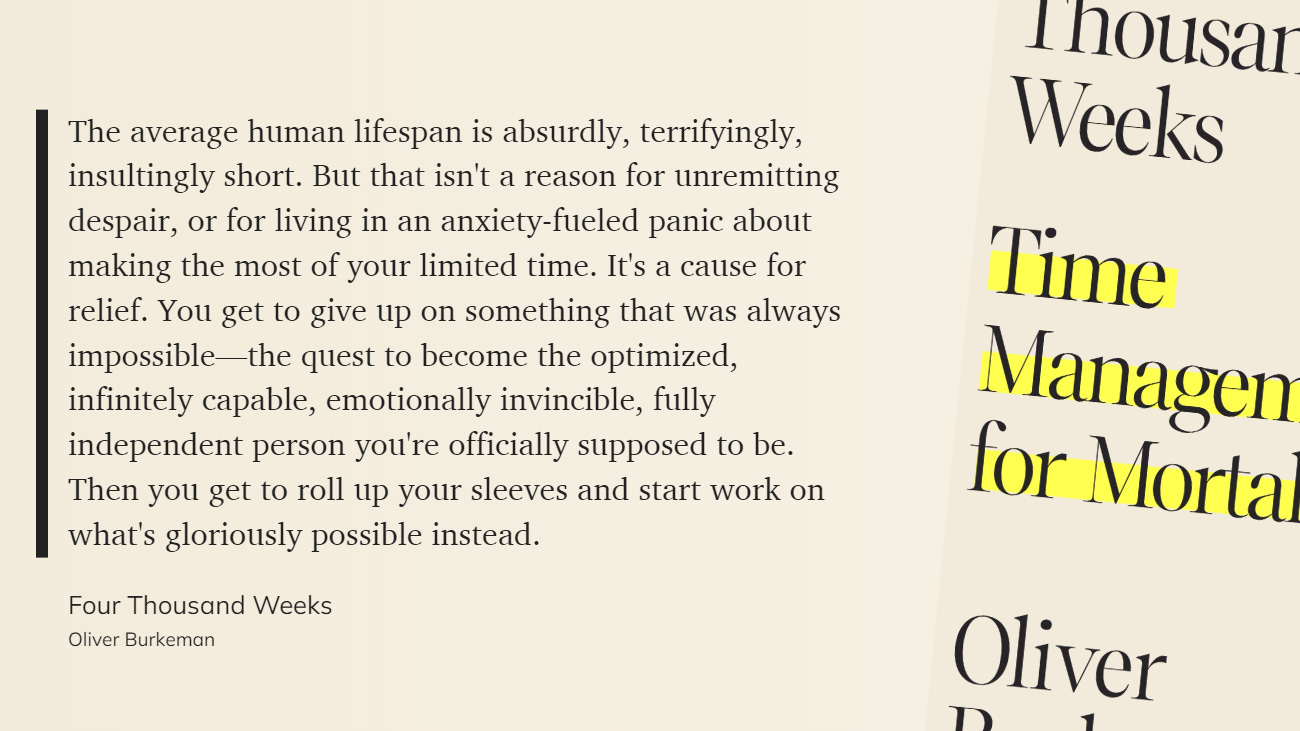Tapestries-46 | "Tapestries"
The first attempt at an updated newsletter format.
Hey fam. It’s been a while since I published something on Tapestry, almost three months to be exact. But the lack of publishing has not been due to a lack of writing. The opposite is true: I’ve been writing more than ever, and have tried to write for thirty minutes most mornings as I aim to get a first draft of the book done.
I’m enjoying the challenge of writing daily, and I’m hopeful I’ll have something to be proud of at the end of the project, whenever that is. But in the meantime, I miss publishing regularly, for two reasons. First, publishing regularly was a great opportunity to get thoughts and ideas out of a jumbled mind and onto a page; for the sake of keeping the engine humming, I’m keen to return to the practice. And second, it was a great channel for consistently engaging with many of you; for the sake of rekindling that interaction, I’m keen to get back into a rhythm. So going forward, I’m going to try a new ~fortnightly update with three short sections:
What I’m thinking: A place to articulate some short thoughts
What I’m consuming: A place to share the best content I’ve consumed in my personal information universe
What I’m writing: A place to share what I’m enjoying, struggling with, or working through in my writing
I like reading, writing and engaging with people I respect, and hopefully this fortnightly update will help me bring those things together more effectively. I’ll aim to keep it short and punchy to spare you from the longer reads. A big thanks to my friend Ahmed at A Few Things for the inspiration for this approach; check out his newsletter for a wonderful weekly update.
So with the introduction and context in mind, I hope you enjoy the first version of this new format, and I look forward to hearing from you again.
1. What I’m thinking

I’m thinking I’m a little confused; that the signals are a little off, or that the world is a little harder to make sense of.
Shinzo Abe’s assassination really struck me. There was something particularly jarring about the murder of the statesman of the world’s third largest economy, in a pacifist country, where gun violence is effectively unheard of. Then in Sri Lanka, protestors stormed and took over the residences of the Prime Minister and President, as the country has spiraled into chaos as result of food inflation (including a disastrous experiment with organic-only farming) and economic carnage that’s seen fuel and medicine in short supply. Ditto in Albania now.
In global oil markets, the allied countries are doing whatever they can to pump and refine as much oil as possible and are bending over backwards to welcome Russian exports back into the market despite the desire to maintain pressure on Putin. And finally, and perhaps most shockingly, the USA now feels like the setting for some morbid video game where we just wait to hear which mundane city, town or store is the location of the next premeditated massacre.
There is generally an identifiable string of events behind each one of these stories, and taken by themselves, they’re all capable of being understood in some abstract sense. But taken together, they give the strong impression the world is in a state of flux; that there is a combustible cocktail of popular discontent, shifting geopolitics and economic uncertainty (which are all naturally linked). As someone who’s only been conscious of the wider world and its interdependencies for the last ~15 years, it’s a somewhat new experience to live through. It reminds me of a quote from Martin Gurri, the thinker I’ve found most adept at explaining the turbulence of our current moment:
Turbulence and disorientation have felt like constants in our lives over the last three years, whether as a result of COVID, a fracturing US political system, war and aggression in Ukraine, and now the prospect of an economic recession. On reflection, I get the sense we’re all waiting to get to the “other side” of each challenge. Once we got over COVID and rolled-out enough vaccines, life was meant to get back to normal. Or once Biden got elected as a “caretaker” President, we expected to return to some normalcy and decorum in the US. And now, perhaps all we need is Russia to end its barbarous campaign in Ukraine soon to spare both more Ukrainian lives and Europe’s winter energy budgets. And maybe, just maybe, we can bring inflation under control without crashing the economy. Our hopefulness has guided us, but as time goes on, it feels more and more misplaced (I spoke to this in the context of risk assessments almost two years ago in this piece).
As these difficult situations increase in number and grow in complexity, it feels like the most likely path forward—the interim steady-state—is one of uncertainty and turbulence. As someone born in 1990, I haven’t really known a period of sustained volatility. So as the world’s stories become harder to understand and the signals more convoluted, my sense is Gurri is right. There may be a new shape of global and economic affairs emerging in front of us, but it’s not one we’re yet ready to perceive or comprehend, or the new contours may not emerge for some time. And perhaps, a capacity for working with the unknown, with uncertainty, and within volatility, is all we can hope to cultivate for now.
It’s not really a plan or anything groundbreaking, just a thought.
2. What I’m consuming
This is a bit of a spin on the personal information universe (PIU) concept I articulated in a piece a year ago. The below is a snapshot of what’s happening in my PIU.
A. Are You a Naïve Realist? By Erika Weisz & Sarah Stamper in Nautilus
“Do you think you see the world objectively and others are biased?” If your answer is yes, like mine, then I’d recommend reading this piece. We are far too quick (me included) to arrive at the conclusion that those who share different views to us are unreasonable, biased or irrational. If you’re interested in some self-reflection and a dose of humility—two critical ingredients we need in order to emerge from our current state of turbulence—then take a read. Thanks to Dean for the share.
B. Four Thousand Weeks (book), by Oliver Burkeman
I just finished this wonderful book about our relationship with time. The book is focused on revealing the finite nature of our brief time on earth (i.e. four thousand weeks), and the power we can unlock by facing up to and internalizing its finitude. Money quote:
Every now and then I read a book that changes how I practically live my life, and this is one of them. Thanks to Ahmed for the suggestion.
C. Stop Being Surprised by Germany, by Jeremy Stern in Tablet
Germany is an an enigma to me, and occupies a hard-to-describe place in my model of the world. In my model I’ve got the WWII legacy; the impression of a highly sophisticated, industrialized country with a strong economy; the dominant figure in both the Europe of the last few centuries, and the European Union of today; and a leader in the West and a key member of NATO and the allies. With all these in mind, I’ve been intrigued by Germany’s positioning and maneuvering in the context of the War in Ukraine. My impression of modern Germany—one I believe is common amongst people in the non-European west—is as described above. This piece, in the outstanding Tablet, helped me understand my and our blind spots when it comes to understanding Europe’s central actor. And as the world redraws its boundaries and allegiances, it feels important to update my understanding of this key figure in the global drama. A long read on the history and politics of post-war Germany, and what we in the West and the US consistently get wrong.
3. What I’m writing
A book. It’s hard. But I’m enjoying it, at least half the time. The book is my attempt at articulating a set of principles I want to live my life by, be held accountable to, and why. I was about 15,000 words into a first draft, and realized the approach was wrong, so I started again, and now I’m about 18,000 words into the draft with the revised approach.
It’s challenging, and that’s part of the point. Sometimes I sit down to write and think “what the fuck do you have to say?” Sometimes I sit down and the words or ideas don’t really come out, and other times they flow in ways I’m really proud of. I’ve listed several principles so far, and have written about two of them. But the book itself is an exploration, and I feel myself questioning whether the principles I’ve written about so far are the “right” or “accurate” ones. I guess the questioning is part of the point. The book is also hard because it’s chicken and egg (i.e. I’ll arrive at the principles through writing), and it’s a practically daunting exercise, but it’s a worthwhile one and I’m glad I’m into the meat of it.
“Distance” has been a recurring theme in the book so far. I’m currently writing a chapter about the distance between our two “selves”—the one we carry around moment to moment, and the one we project to our networks or global audiences. The chapter describes the implications of this distance, and a model principle for shortening it. I initially thought the principle I’d cover in this chapter was “authenticity,” but have reframed it instead to “integrity,” as authenticity is only a primary virtue in a world that prioritizes brand and performance, two things I’m critical of. The observations in these first drafts of the chapters drag on a little, so I’m intent on finishing the descriptions and exploring the relevant principle in more detail.
In practical terms, I’m trying to regularly discuss some of the core concepts in the book, as talking about them is really helpful in refining the ideas. Reach out if that sounds interesting to you and we can setup a chin-wag.
Thanks for reading as always. Please hit “Reply” to let me know any feedback on the format and content. I’ll be on vacation in the second half of the month, so will see you on the other side for the next iteration.




Another thought provoking, great article Daniel.
Gurri’s book was written in 2018. Are the changes that have occurred since then our new norm so as to expect the unexpected?
Always look forward to our chats Daniel.
Looking forward to your book.